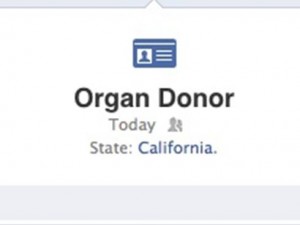I agree, mostly, with Art Caplan’s analysis of Facebook’s decision to add “Organ Donor” as a Life Event on their website. I agree that the DMV is about as poorly suited as a state organization could be to engage with citizens about the possibility of being an organ donor. Facebook is undoubtedly the world’s largest megaphone for raising social awareness about issues–the media attention alone is likely to spur many Facebook users to think about being an organ donor, and maybe, if we’re lucky, to have a conversation with friends and family about it. Moreover, any activity on the part of social networks and major corporations to increase the number of organ donors worldwide is laudable. And Facebook’s may even work.
But what Caplan doesn’t address fully are the potential downsides of using Facebook as a way to declare one’s preference about organ donation. In the last two hours (since I first saw the story on Twitter) the following concerns have come to mind. Please note I am not suggesting that these concerns outweigh the potential benefits of having organ donor status on Facebook. I think that this has the potential to result in a significant number of people volunteering to donate. But the jury is still very much out on that and it will depend on whether Facebook users are willing to share their decision on the Internet and then talk about it. But here are my concerns nonetheless:
1) Will OPOs try to appeal to one’s declared Facebook status about organ donation to override or simply pressure other declarations (or lack thereof) or family preference to donate? Most OPO staff I know are incredibly sensitive and supportive of family preferences and decision-making, but what about other less ethically sensitive OPOs?
2) What level of thought goes into one noting organ donor status on Facebook? I updated my organ donor status on Facebook this morning after I read an article about it. And immediately after that I updated other “life events” on Facebook like recent moves, jobs I’d held, and other events. In all it took under 5 minutes to list dozens of life events. Will those who think a lot less about the decision to donate than the average bioethicist make the choice willy-nilly?
3) A concern related to the second one above is that the Facebook status update provides no education to potential donors as they make the choice. Arguably that isn’t the job of Facebook, but I think it should offer a few more links to information about the decision to donate than a link to your state’s registry. The FAQs about the organ donation life event direct you to the Donate Life Facebook page which then directs you to sign up for your state’s donor registry (about 3 more steps). That may be three steps too many for most people not motivated to donate but who are curious and where is the education? I went through the entire process and never learned anything about the donation process, whom it would help, or what to do after I signed up.
4) Will those who aren’t educated about organ donation believe that saying they want to be an organ donor on Facebook replaces signing up at the DMV or as part of a state registry? If so, without those declarations made with the state all an OPO would have to appeal do is their Facebook status (which returns me to concern #1 above). There isn’t enough in the current setup on Facebook to ensure that the information is shared with friends, family or specifically next of kin (i.e. the people whom the OPOs will be asking for permission to take your organs). Adding a simple “Share” button or by default sharing it with family members would help start that conversation.
Of course, there are wonderful opportunities for OPOs and state registries to work with Facebook to make this interface even better. Arguably if individuals, OPOs or states are going to rely upon declarations made on Facebook as to donation preferences, they need to coordinate, provide education, and even periodically prompt Facebook users to revisit their donation choice. Every two years or when someone updates their marital status or number of children, Facebook could prompt the user to update their organ donation status. The possibilities are endless.
And that gives me another idea. Once Facebook has worked out the kinks with the organ donation status, perhaps they should look into advance care planning and advance directives.
Summer Johnson McGee, PhD
